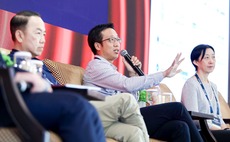
Profile: NewQuest's Darren Massara
Darren Massara is familiar with difficult investment environments the world over. He is relying on these experiences to help NewQuest find success in Asia’s direct secondaries market
"I'm not proud of it, but I've seen my fair share of difficulties in nearly every emerging market," says Darren Massara. "And I've got battle scars to prove it - from Latin America to Africa to Asia." These experiences, which came while wearing the colors of International Finance Corp. (IFC) and then Merrill Lynch, have stood him in good stead.
As head of NewQuest Capital Partners, Massara's objective is to acquire assets that Asian investors want to exit but are unable to generate liquidity from through conventional channels and then work with management to drive value over time. This form of direct secondaries - essentially stepping into the shoes of another equity provider - relies on an ability to act quickly across a range of sectors and geographies.
It is familiar territory for someone who spent eight and-a-half years flying in and out of emerging markets as a dealmaker for IFC and then picked up the pieces of Merrill Lynch's principal investment unit in the wake of the global financial crisis.
"I may not appreciate the strange cuisine some guy is serving me at a business dinner in western China, but it's certainly easier than driving through hostile territory in northern Sri Lanka," Massara says, explaining how past activities help one keep current challenges in perspective.
Having studied international finance and development, he began his private equity career in 1998-1999, not long after financial crises in Asia, Russia, Mexico and Argentina had decimated private sector interest in frontier investing. IFC was one of few institutions still pursuing deals in emerging markets and Massara won a place on the global transactions team.
Taste of the bizarre
The first year-and-a-half was spent working on infrastructure investments in Argentina, China and everywhere in between. Then he transferred to the telecoms team and helped set up fixed-line and mobile networks, before expanding the remit to encompass the wider technology and media sectors.
"I was based in the US but I was constantly flying all over the place, visiting several countries over the course of one week," Massara recalls. "I would fly from South Africa to Turkey to Russia to India to China and around the world."
Making minority investments in several continents under IFC's positive development remit inevitably threw up its fair share of oddities. Countries embroiled in civil war were obviously complicated to work in, but Massara says his strangest deal was also one of the most lucrative: the purchase of a stake in a Russian television station in 2004, during a time when the government was shutting down broadcasters and jailing journalists.
An early challenge was convincing IFC that the investment fell within its scope. "We made the case that in an environment where the media is somewhat controlled, having free speech and access to content contributes to the overall development of a market economy," he says. It was one of IFC's first media investments and it delivered a 10x return on equity when exited to a larger strategic player just a couple of years later.
A desire to focus on one region saw Massara leave IFC in early 2007 and move to Asia to focus on principal investments for Merrill Lynch across the region. A year after joining, the global financial crisis hit and ambitious plans for growth were replaced by chronic uncertainty.
"In September 2008, no one in the market had a clue what was going to happen" he says. "I got on a plane in San Francisco not knowing if the firm was going to exist the next morning. I landed, called my wife, and she said, ‘You're still alive but you're not Merrill Lynch any more, you're Bank of America'."
The principal investment team wasn't the only group making private equity investments at Merrill Lynch so Bank of America rounded up all the equity assets into one group and asked Massara to manage them. At the height there were 75 different transactions ranging from energy companies in India to golf courses in Japan. His task was to figure out what the bank owned, what it was worth, and devise exit strategies without resorting to a fire sale.
NewQuest was born out of these efforts. After divesting the bulk of the assets, Massara and four other members of the core team spun out, taking more than 20 private equity positions with them and raising a US$400 million fund backed by HarbourVest Partners, Paul Capital, LGT Capital Partners and Axiom Asia.
Future expectations
Massara expects to see considerable deal flow over the next few years. He estimates that about US$200 billion of private equity capital invested in Asia since 2005 has yet to find an exit. NewQuest's willingness to buy assets from GPs and other PE investors represents an alternative source of liquidity, allowing fund managers to return money to investors.
He believes his firm's principal talent is an ability to work with company management and find liquidity for investors. This in part relies on an understanding of entrepreneur mindsets across several countries, a byproduct of Massara's multi-jurisdictional past. More investors will likely target the market niche that NewQuest currently calls its own but it remains to be seen whether they have sufficient familiarity with the space to do it well.
"It's a hard business model and we have a particular expertise that is suited to it," he says. "For example, in a primary deal you may get to spend 120 hours with the management team before you invest. In a direct secondary portfolio deal it's far less, so how do you decide which companies to focus on and how do you price them? It certainly takes a different approach."
Latest News
Asian GPs slow implementation of ESG policies - survey
Asia-based private equity firms are assigning more dedicated resources to environment, social, and governance (ESG) programmes, but policy changes have slowed in the past 12 months, in part due to concerns raised internally and by LPs, according to a...
Singapore fintech start-up LXA gets $10m seed round
New Enterprise Associates (NEA) has led a USD 10m seed round for Singapore’s LXA, a financial technology start-up launched by a former Asia senior executive at The Blackstone Group.
India's InCred announces $60m round, claims unicorn status
Indian non-bank lender InCred Financial Services said it has received INR 5bn (USD 60m) at a valuation of at least USD 1bn from unnamed investors including “a global private equity fund.”
Insight leads $50m round for Australia's Roller
Insight Partners has led a USD 50m round for Australia’s Roller, a venue management software provider specializing in family fun parks.








